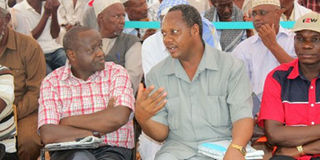Envoy accused of Garissa killings

Issa Hussein | NATION
Kenya’s high commissioner to Nigeria Francis Sigei (left) and Mr Maina Ndung’u, a senior officer in the Ministry of Justice at the public gallery during a hearing session by the Truth, Justice and Reconciliation Commission in Garissa Wednesday.
Kenya’s envoy to Nigeria Francis Sigei was Wednesday on the spot over claims of murder, rape and torture when he was a district commissioner.
The atrocities were allegedly committed by security officials during an operation against shifta insurgents in Garissa County in the 1980s.
Mr Yakub Adow Abdi, who was a councillor at the time, accused Mr Sigei of assaulting him when he arrived at Galmagala trading centre in a helicopter where four police officers taking salaries to Holugho Police Station were ambushed and killed by bandits.
Mr Abdi told the Truth, Justice and Reconciliation Commission during its hearings at the Garissa Public Library that when Mr Sigei arrived at the scene of the attack, he ordered the police to round up residents.
“We thought his arrival will end our torture at the hands of the security officers sent to pursue the bandits, but we were shocked when he asked us to give him the names of the culprits who had killed his officers,” Mr Abdi said.
The former councillor said he told the DC the bandits were from across the border, but in response the official attacked him.
“He kicked me in the ribs. Other well-built officers descended on me with kicks and gun-butts until I fell down unconscious,” he said amid sobs.
Mr Abdi said 20 people died in the 1989 Galmagala operation and many women were gang-raped by security officers.
Asked by the truth team’s presiding chairman, Prof Ronald Slye, if he could identify Mr Sigei, Mr Abdi said he could.
Mr Sigei sat in the public gallery as Mr Abdi spoke in the library. Prof Slye said Mr Sigei would address the commissioners today but did not give the time when the former DC will give his side of the story.
Some 300 people are said to have been killed in the Garissa Gubay atrocities of 1980.
Mr Sahal Yerrow, whose pregnant wife was shot dead by people he claimed were police officers, said he had lived with the sad memory ever since.
He said the security officers raided the village and fired at residents indiscriminately.
“We ran for dear life but four people, including my wife who could not run because she was heavy with child, died on the spot,” said a teary Mr Yerrow.
Mr Hussein Farah Waju, whose wife was also allegedly killed by a police officer whom he said was still serving in the force, sobbed uncontrollably and said his has been a long journey to seek justice. “I wrote to then provincial commissioner Maurice Makhanu and a former police commissioner asking for justice but all in vain,” said Mr Waju.
He said one of his daughters was so traumatised by the shooting of her mother that she suffered a mental breakdown.
“I am witnessing a truly remarkable turnaround in northern Kenya with this commission. I hope justice will come soon,” said Mr Waju.
Separate proceedings were taking place in camera at the Farmers Training Centre for rape victims from which the media were barred.
The hearings end tomorrow after which the commission proceeds to Wajir.
The commission was established to investigate gross human rights violations and other historical injustices in Kenya between 12 December 1963, and 28 February 2008.
The injustices include economic crimes, irregular and illegal acquisition of public land, marginalisation of communities and ethnic violence.




